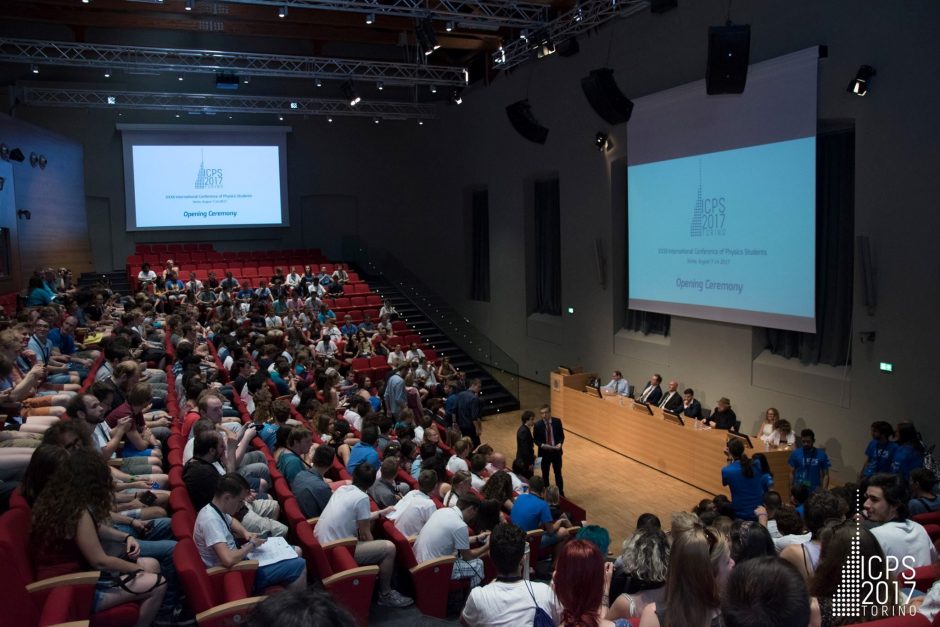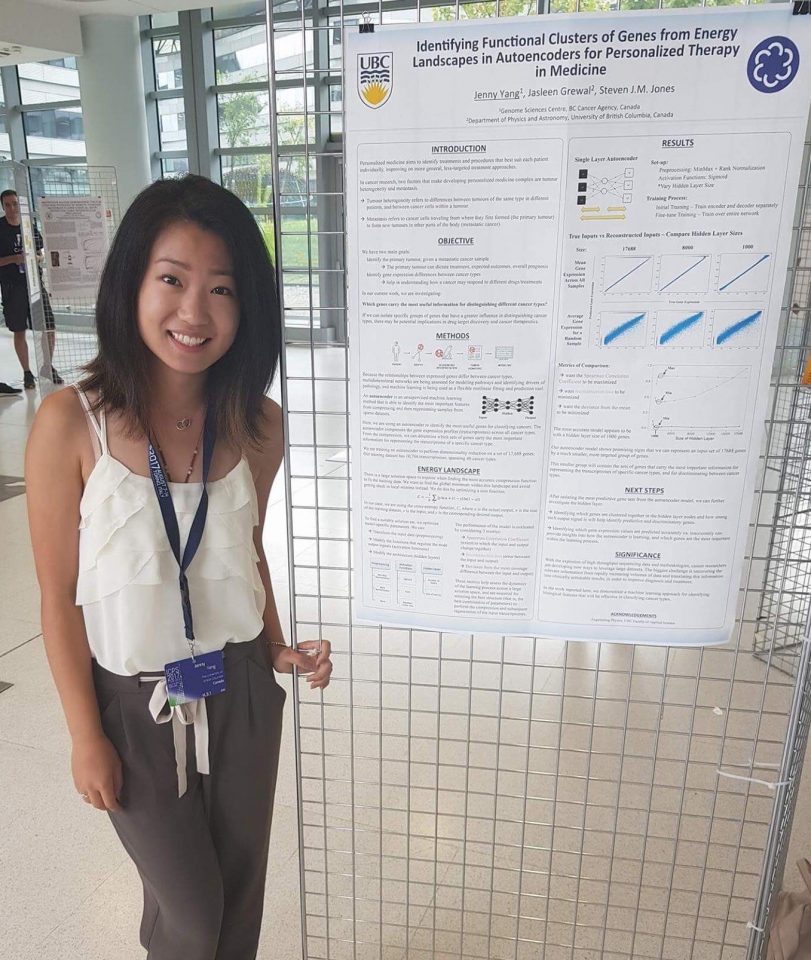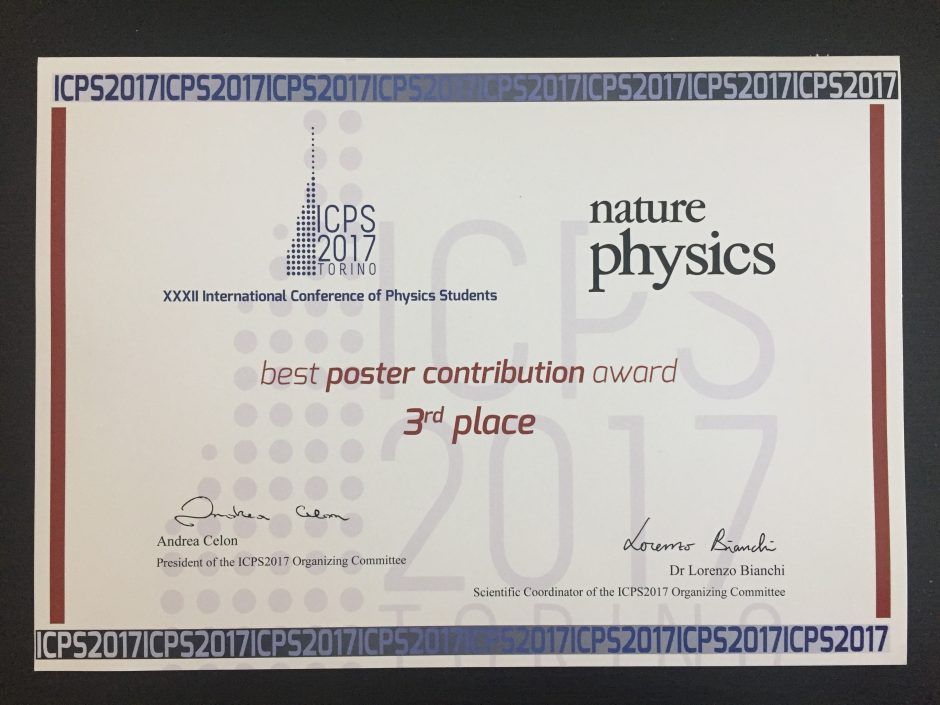Well done Jenny Yang for an excellent presentation to the International Conference of Physics Students August 7 – 14, 2017, in Turin, Italy on her research project at the Genome Sciences Centre: Identifying Functional Clusters of Genes from Energy Landscapes in Autoencoders for Personalized Therapy in Medicine (Jenny Yang, Jasleen Grewal, Steven Jones). Abstract:
“In the pursuit of personalized medicine within oncology, growing attention is being given to machine learning for cancer diagnostics and treatment. Because machine learning is at the interface of theoretical physics and high-dimensional statistics, the accuracy and success of a model may not depend on computational power or algorithm complexity. Instead, it can depend on comprehensively understanding the theoretical dynamics and energies of the data system itself. Our goal is to analyze the energy landscape of our autoencoder model, for purposes of determining which genes carry the most predictive information in classifying different cancer types.”

The purpose of the conference is to create an opportunity for physics students from all around the world to come together, talk about science and technology, present their research, and learn from world-renowned scientists. ICPS 2017 had over 400 participants and 200 scientific contributions. Bachelors, Masters and Ph.D. candidates presented in many areas of physics including particle physics, quantum computing, and nuclear physics.

In addition to her presentation, Jenny won 3rd place for the “Best Poster Contribution” award sponsored by Nature Physics.

Jenny Yang: “With submission of my CV and a short text of motivation, I qualified for the ICPS bursary. I was also chosen to represent Canada (specifically, the Canadian Association of Physicists) at the IAPS (International Association of Physics Students) Annual General Meeting. During the Annual General Meeting (AGM), delegates representing National Committees (NCs) and Local Committees (LCs) as well as individual members discuss and deliberate on a number of topics ranging from memberships to regulations and grants.
I had an incredible experience at the ICPS 2017. From this experience, I’ve explored, learned about, and shared innovative endeavors within physics. I was inspired and fascinated by both the talks given by the guest lecturers and the presentations given by other physics students. Aside from the scientific portion of my experience, I also had the opportunity to go around the beautiful city of Turin and try some amazing Italian cuisine.
Overall, it was really remarkable to interact and deliberate with individuals from all around the world, who share a common passion – physics.”

Some of the keynote speakers included:
- James Kakalios – Professor Kakalios is a physics professor at the University of Minnesota. He wrote the book The Physics of Superheroes, where he analyzes the actions and contexts of comics’ superheroes from the point of view of fundamental physics.
- Francesco Tombesi – Francesco Tombesi is an astrophysicist at NASA’s Goddard Space Flight Center and a research scientist at the Department of Astronomy of the University of Maryland, College Park. His research focuses on supermassive black holes in Active Galactic Nuclei through X-ray observations collected from orbiting satellites. In particular, he investigates the origin of black-hole-driven winds, such as the powerful ultra-fast outflows and their feedback on the AGN host galaxies.
- Steven Cowley – Steven Cowley is a leading plasma physicist and controlled fusion scientist. He is currently the President of Corpus Christi College, Oxford. He spoke about the future of fusion energy.
Some of the workshops included:
- COMSOL MultiPhysics Web – COMSOL MultiPhysics ®is a finite element analysis package which allows to study physical processes where coupled, nonlinear phenomena are of particular interest. The first half of the workshop showed the capabilities and workflow of the COMSOL Multiphysics®software. The second half focused on High-Frequency Electromagnetics modelling as an example of a more advanced application.
- Arduino Microcontrollers – Arduino is an open-source company that produces both hardware and software allowing the construction of digital devices with interactive (sensing) capabilities. Arduino boards are internationally applauded as ideal means to learn about microcontrollers and general programming in electronic applications, so this workshop explored some of the basics of using Arduino microcontrollers.
- Scientific Publishing from an Editor’s Point of View – Sharing scientific results is an important and challenging part of a physicist’s work. Andrea Taroni – Chief Editor of Nature Physics – shared his experience in scientific publishing as part of one of the largest scientific publishing companies in the field. Andrea Taroni explained good practices for the submission of scientific articles, as well as shared his personal views on the editorial process.